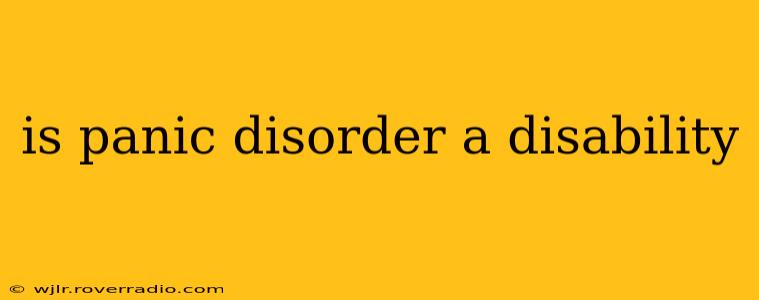Panic disorder, characterized by unexpected and recurrent panic attacks, can significantly impact a person's life. The question of whether it constitutes a disability is complex and depends heavily on its severity and the individual's specific circumstances. While not automatically classified as a disability, panic disorder can certainly qualify under certain legal frameworks, such as the Americans with Disabilities Act (ADA) in the United States.
What is Panic Disorder?
Before delving into the disability aspect, it's crucial to understand panic disorder itself. It's an anxiety disorder marked by intense, overwhelming fear that comes on suddenly and unexpectedly. These panic attacks can involve a range of physical symptoms like a racing heart, shortness of breath, chest pain, trembling, sweating, and dizziness, often accompanied by feelings of impending doom or losing control. The persistent worry about future attacks or significant changes in behavior to avoid them further defines the disorder.
Can Panic Disorder Qualify as a Disability Under the ADA?
The ADA defines a disability as a physical or mental impairment that substantially limits one or more major life activities. For panic disorder to qualify, the impairment must significantly restrict daily functions. This isn't about occasional anxiety; it's about the disorder's pervasive impact.
Examples of how panic disorder might substantially limit major life activities include:
- Working: Frequent panic attacks making it impossible to maintain employment or limiting career advancement.
- Caring for oneself: The debilitating effects of panic attacks interfering with basic self-care like showering, eating, or dressing.
- Social interaction: Intense anxiety preventing participation in social activities or maintaining relationships.
- Concentrating: Difficulty focusing due to constant worry or the aftermath of panic attacks hindering educational pursuits or job performance.
Crucially, the ADA focuses on the impact of the condition, not just the diagnosis itself. A person with a diagnosis of panic disorder might not automatically qualify for disability benefits or accommodations. A thorough assessment of the disorder's impact on their life is necessary.
How is Panic Disorder Diagnosed and Assessed for Disability?
Diagnosis typically involves a comprehensive evaluation by a mental health professional, often a psychiatrist or psychologist. They'll review symptoms, medical history, and rule out other potential causes. Determining whether it constitutes a disability under the ADA or similar legislation requires documentation demonstrating the substantial limitation on major life activities. This usually involves:
- Medical records: Detailed documentation of symptoms, treatment, and the impact on daily life.
- Functional assessments: Evaluations assessing the individual's ability to perform everyday tasks.
- Third-party reports: Statements from family, friends, employers, or teachers corroborating the impact of the condition.
What Accommodations Might Be Available for Someone with Panic Disorder?
If panic disorder is deemed a disability, reasonable accommodations may be available in the workplace or educational settings. These could include:
- Flexible work arrangements: Adjusted schedules, telecommuting options, or modified work duties.
- Quiet or private workspace: Reducing exposure to triggers that could precipitate panic attacks.
- Mental health days: Time off for managing symptoms and seeking treatment.
- Stress management training: Developing coping mechanisms to reduce anxiety.
- Support animals: In some cases, an assistance animal can provide comfort and support during anxiety episodes.
Is Panic Disorder Automatically Considered a Disability for Social Security Disability Insurance (SSDI)?
No, panic disorder is not automatically considered a disability for SSDI. The Social Security Administration (SSA) uses a strict five-step sequential evaluation process to determine eligibility for SSDI benefits. The applicant must demonstrate that their panic disorder prevents them from performing any substantial gainful activity (SGA) for at least 12 months. Meeting this criterion requires comprehensive documentation illustrating the severe and persistent nature of the impairment.
Can Panic Disorder Affect My Ability to Drive?
The impact of panic disorder on driving varies greatly. While some individuals may experience minimal disruption, others might find driving extremely challenging or even impossible due to the fear of having a panic attack while behind the wheel. This decision often requires careful consideration and may involve input from healthcare professionals and driving rehabilitation specialists.
How Can I Get Help for Panic Disorder?
Numerous effective treatments are available for panic disorder, including therapy (cognitive-behavioral therapy (CBT) is particularly effective), medication, and lifestyle changes. Seeking professional help is crucial for managing symptoms and improving quality of life. Your doctor or a mental health professional can guide you toward appropriate treatment options.
This information is intended for educational purposes only and should not be considered medical advice. Always consult with a qualified healthcare professional for diagnosis and treatment of any medical condition.
